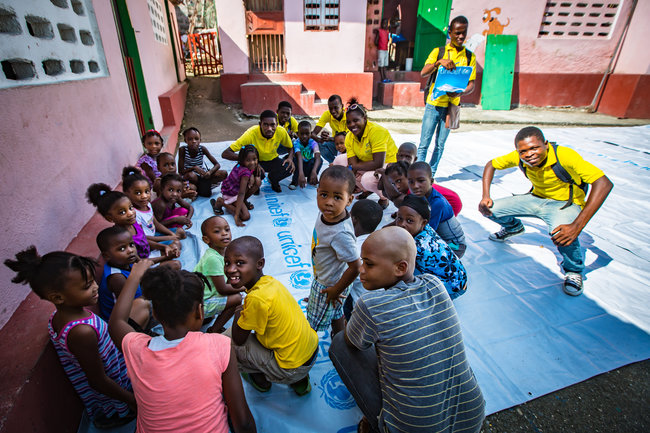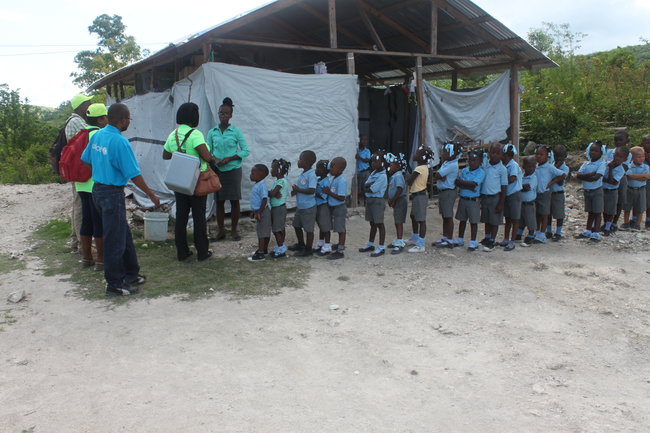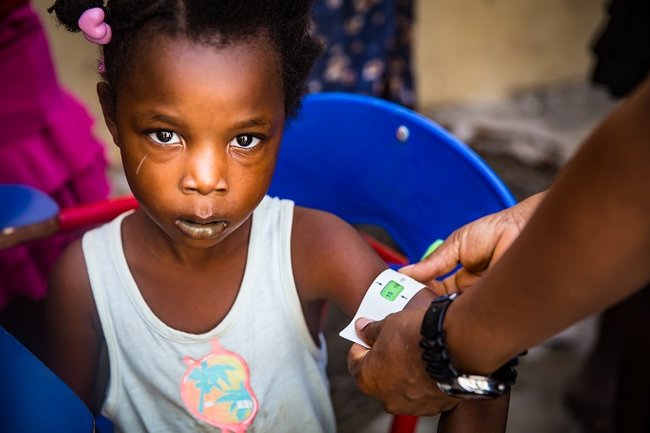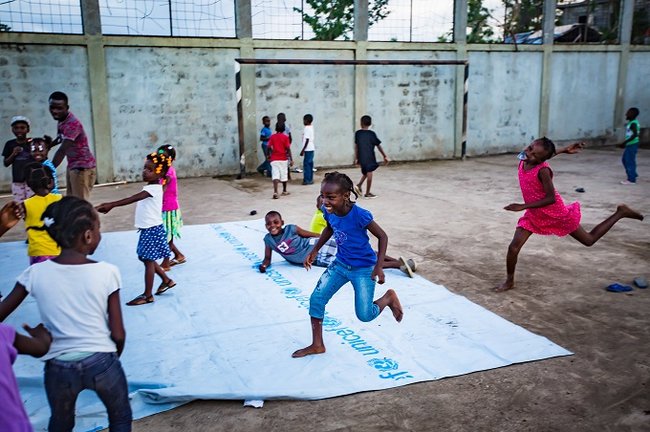Hurricane Matthew three months on: Life for Haiti's children
2017-01-09
© UNICEF/UN047287/Bradley

© UNICEF Haiti/2016/BradleyChildren and young community volunteers at a UNICEF supported child friendly space in Haiti.
When Hurricane Matthew passed over Haiti in early October 2016, it flattened entire neighbourhoods and destroyed the livelihoods of large portions of the population. UNICEF is working with the Government to address the lasting impacts on children, including protracted food insecurity, persistent risk of disease, and disruptions to the infrastructures of water and sanitation, education and health.
PORT-AU-PRINCE, Haiti/HONG KONG, 9 January 2017 – Around three months ago hurricane Matthew hit Haiti, disrupting the lives of over two million people. In addition to the personal losses of homes and crops, more than 716 schools, numerous health facilities, and the existing sanitation infrastructure all suffered damage. Today, 1.4 million people in Haiti, including 600,000 children, require humanitarian assistance.
UNICEF is working with the Government and other partners to address the immediate basic needs of children and families, ensuring that these interventions lay the foundation for rehabilitation and resilience.
At least 716 schools were damaged after hurricane Matthew, according to the official data of the Ministry of Education. An estimated 490,000 children have had their education interrupted. Schools need to be repaired urgently, and students and teachers who lost everything need school supplies.
UNICEF is supporting the Ministry of Education in the rehabilitation of 121 schools. Specific actions include coordinating education partner activities, providing school furniture and once the schools reopen, distributing school-in-a-box kits – benefiting more than 20,000 school children.
Roberline Doré, a 13-year-old student in her fourth year, cannot conceal her joy at being able to return to school. "I felt very bad because I saw our house being destroyed. My family and I were soaked by the rain. I lost everything, including my books, my notebooks and my school bag. The director of the school gave us some suitcases, to save what we could," she says.
"I am very happy to be back in school. I was sad before, seeing other children going to school, when we couldn’t. We spent so many weeks without school. Now I’m very happy, and I get to see my friends again!”

© UNICEF Haiti/2016/Fanfan13-year-old Roberline (centre) is delighted to be back at school.

© UNICEF Haiti/2016/FanfanSchool children queue up to receive a cholera vaccination. It took just over two hours to protect 42 children under 5 and their teachers from the disease.
In Haiti, water-borne diseases such as cholera and acute diarrhoea flourish in the wake of a disaster such as hurricane Matthew. These diseases disproportionately affect children. The storm also caused substantial loss and disruption to public health systems that were already fragile.
"Our first priority has been to ensure that children and their families have access to safe drinking water. Today, 281,000 people per day, including more than 118,000 children, have access to safe water as a result of UNICEF-supported activities such as the installation of a water treatment plant for the city of Jérémie and 20 mobile water stations serving the affected departments," says Marc Vincent, UNICEF Representative in Haiti.
When patients are admitted to acute diarrhoea treatment centres, UNICEF’s rapid response teams check the register to find the area where they are from, then visit their homes and implement the ‘cordon sanitaire’ strategy to stop the spread of disease. Buckets fitted with a tap are distributed, as well as tablets for disinfecting water, oral rehydration salts and soap. This sanitary kit covers one family for a month.
"The strategy is to ensure that not only the house of the affected person is cleaned with chlorinated water, but also those around it – forming a ring of sanitation. Afterwards, the people are informed of practices that limit the risk of becoming infected," says Samuel Beaulieu specialist Emergency and Cholera at UNICEF Haiti.
The Ministry of Health, supported by UNICEF and PAHO/WHO delivered a cholera vaccination campaign in the South and Grand’Anse departments in November 2016, immunizing 807,395 individuals, including over 309,213 children aged 1–14 years.
There is concern that the nutritional status of children in Haiti will continue to deteriorate, due to several factors. The spread of infectious diseases, particularly diarrhoea caused by a lack of access to safe water, can increase rates of malnutrition. Lack of nutritious food due to crop destruction (70–100 per cent of crops have been destroyed in the affected areas) is another serious issue, compounded by significant loss of livestock and livelihoods.
UNICEF provides technical and financial support to nutrition centres to help with early detection and management of acute malnutrition, focusing on those in areas most affected by the hurricane.
In areas where centres are inactive, UNICEF partners like Médecins du Monde are providing essential health and nutrition services through mobile clinics until routine health services are restored.
These mobile clinics allow medical staff to administer first aid, prenatal consultations, screen for diseases and provide vaccines to children. The staff will also be able to identify more complicated cases and refer them to other care facilities for appropriate treatment.

© UNICEF Haiti/2016/BradleyA girl is screened for acute malnutrition by measuring the upper-arm circumference. It is a quick, simple, yet very effective tool to identify children who are too thin and at high risk of mortality.

© UNICEF Haiti/2016/BradleyChildren having fun in one of the UNICEF supported child friendly spaces that provide a safe environment to play and be themselves, despite the challenging circumstances.
The safety of children and families has been significantly affected by the hurricane. Food insecurity caused by significant crop losses continues to grow, while economic losses leave children vulnerable to dangerous situations such as child labour or transactional sex in an effort to augment income.
Family-based care is an emergency priority in this context where already 1 in 4 children is not living with his or her parent(s).
In collaboration with the IBESR (Ministry of Social Affairs), UNICEF is reaching 4,468 children with basic needs assistance including hygiene kits, blankets and food, as well as documentation assistance for documents lost in the hurricane.
UNICEF also supports child friendly spaces that provide children between the ages of 3 and 17 with a safe environment to play and be themselves, despite the challenging circumstances.
“Following hurricane Matthew we found that many children in the CFS [child friendly spaces] have had nightmares or panic attacks. Their trauma manifested in the children’s’ behaviour, in their drawings,” says Laura Gaici, protection manager with AVSI Foundation, an international NGO working in partnership with UNICEF. “Often these children are very concerned about the fate of people dear to them, especially their parents, fearing that those people may disappear at any time in their lives. They are constantly afraid of being left alone.”
“I love being with children, and guiding them on their way,” says 21-year-old Shanam Riche. He is one of 60 community members who have come forward to volunteer in child friendly spaces.
Much remains to be done to reach all Haitian children and families who have been affected by Hurricane Matthew. For the year ahead and beyond, UNICEF will continue to pursue its goal of a fair chance for every child.









